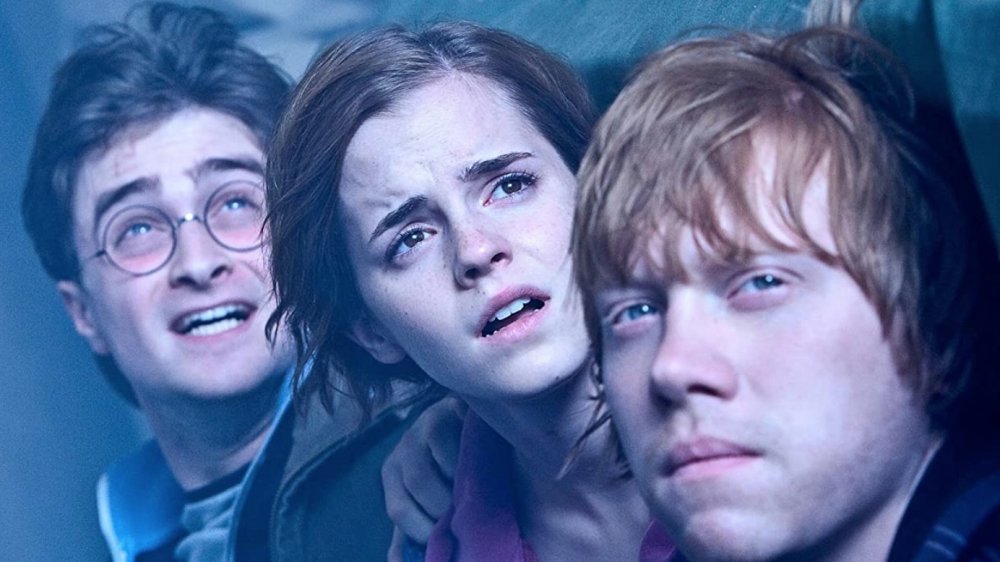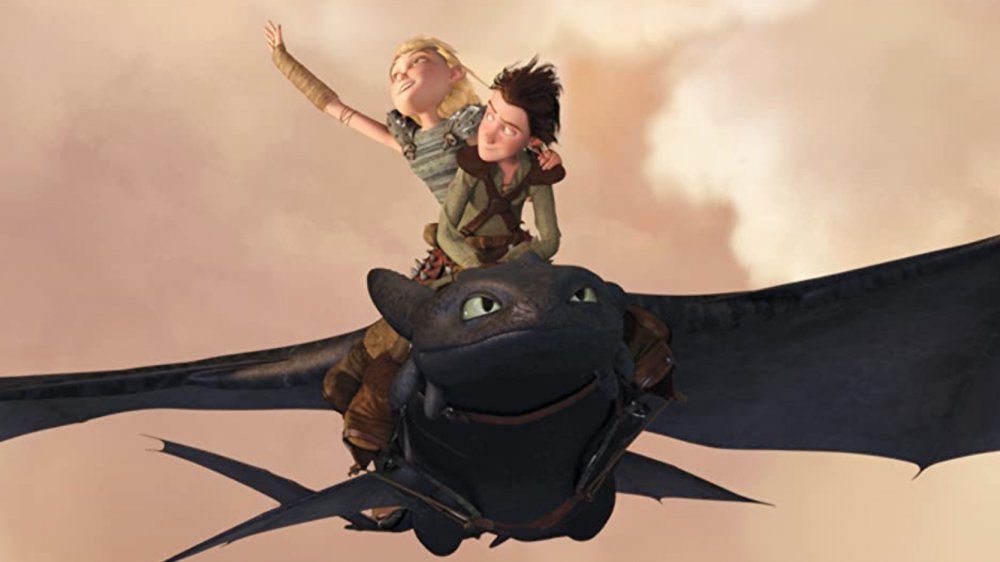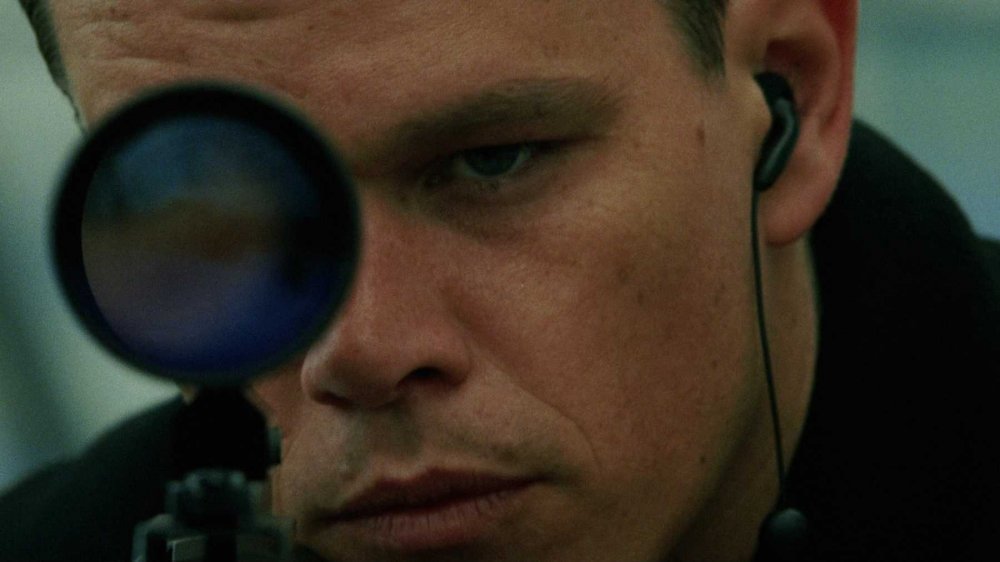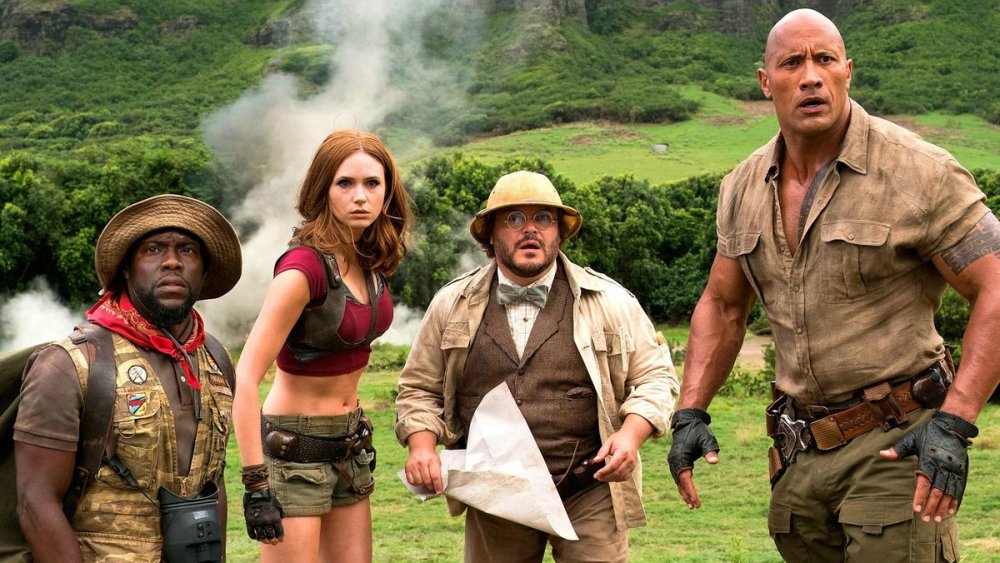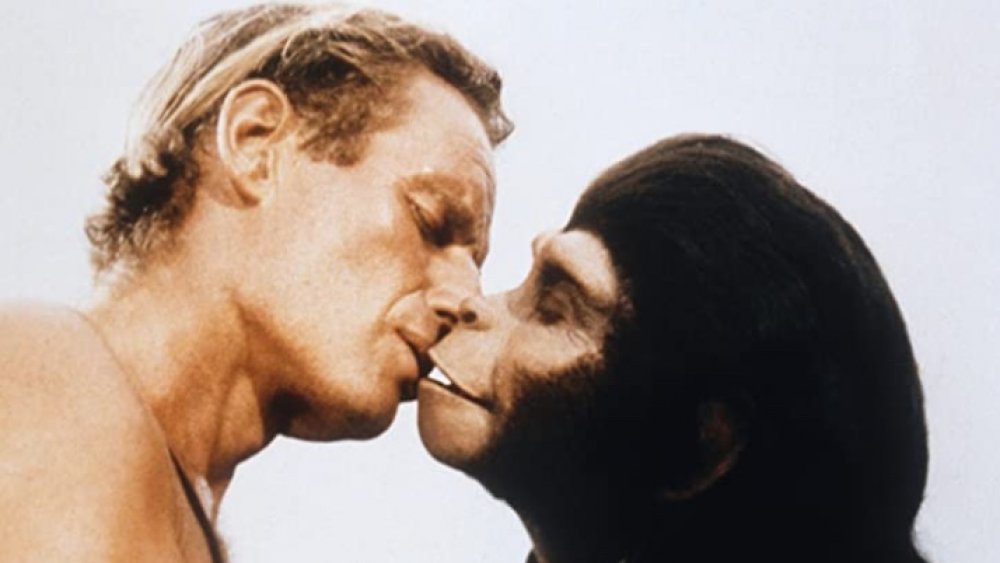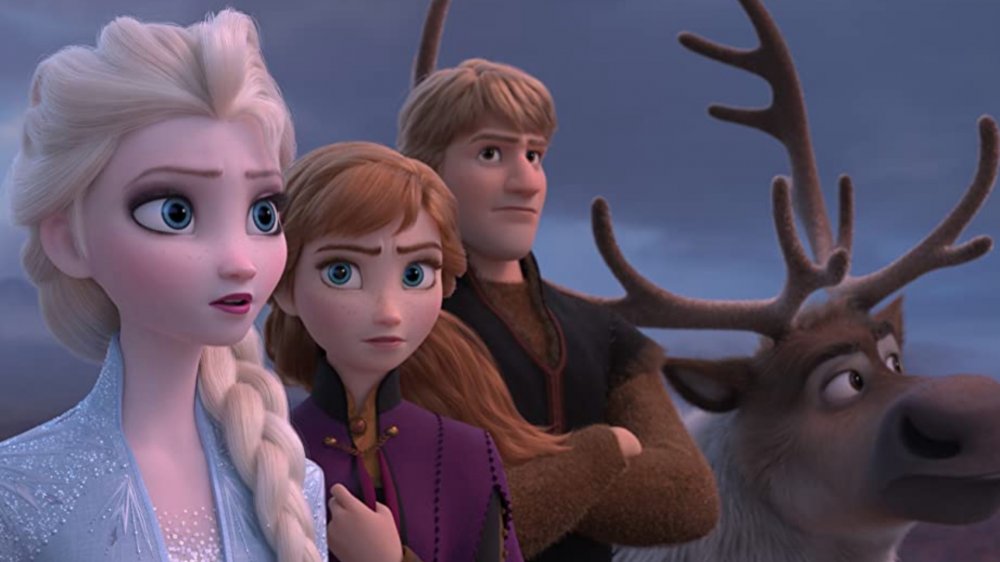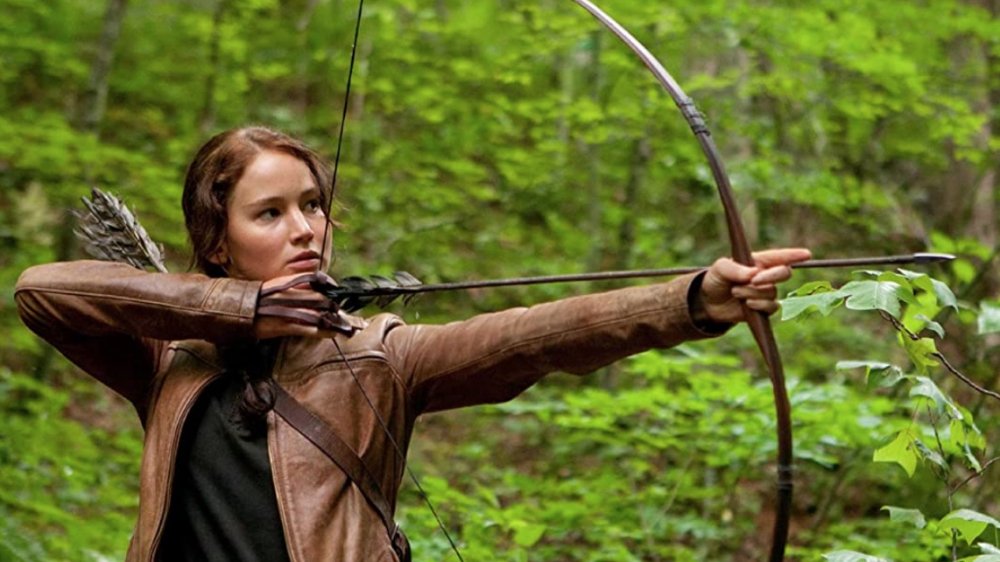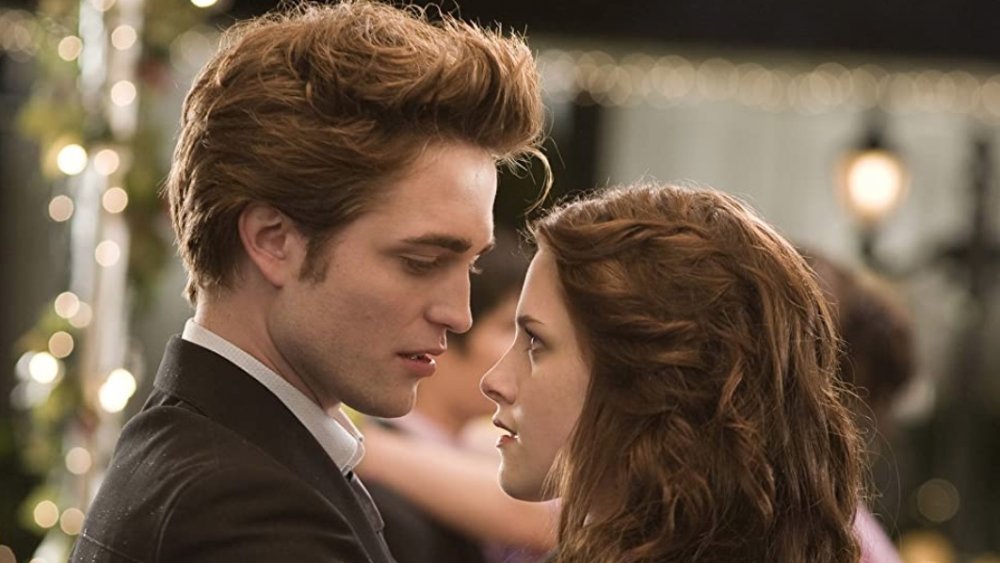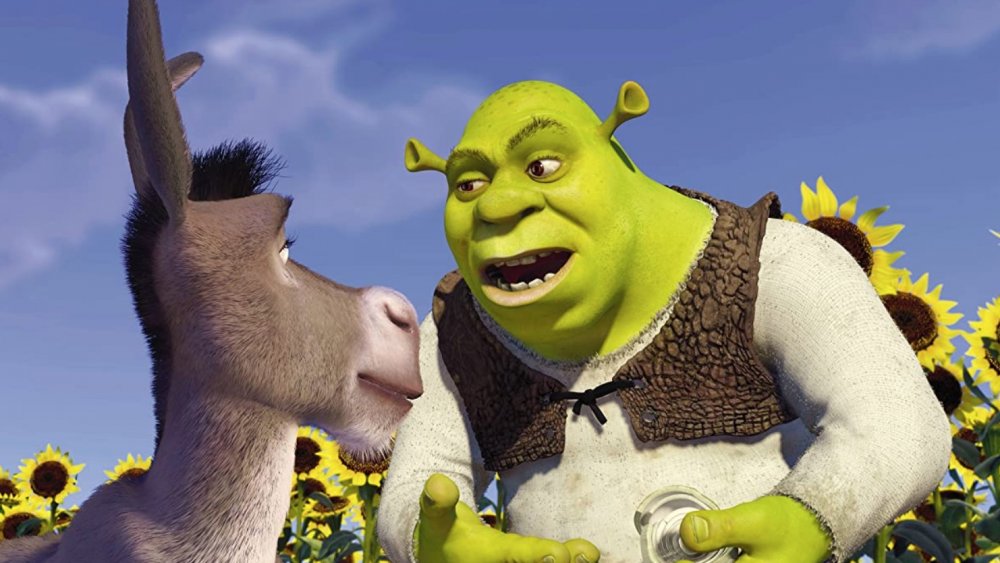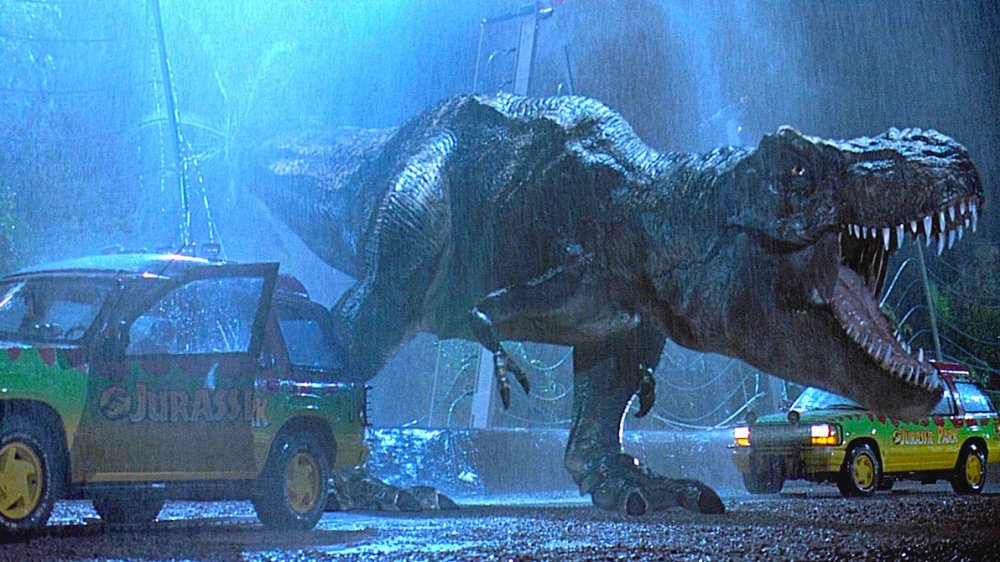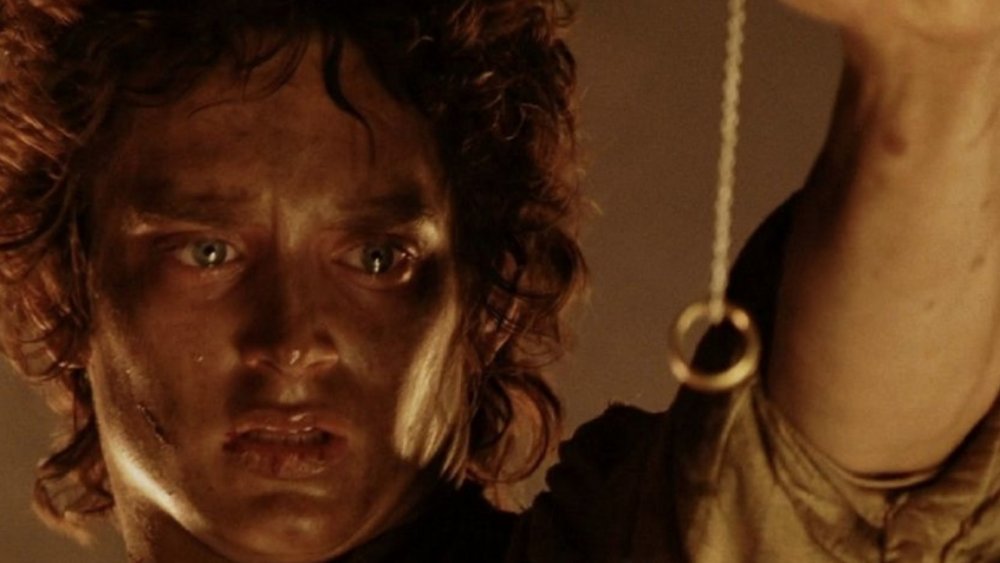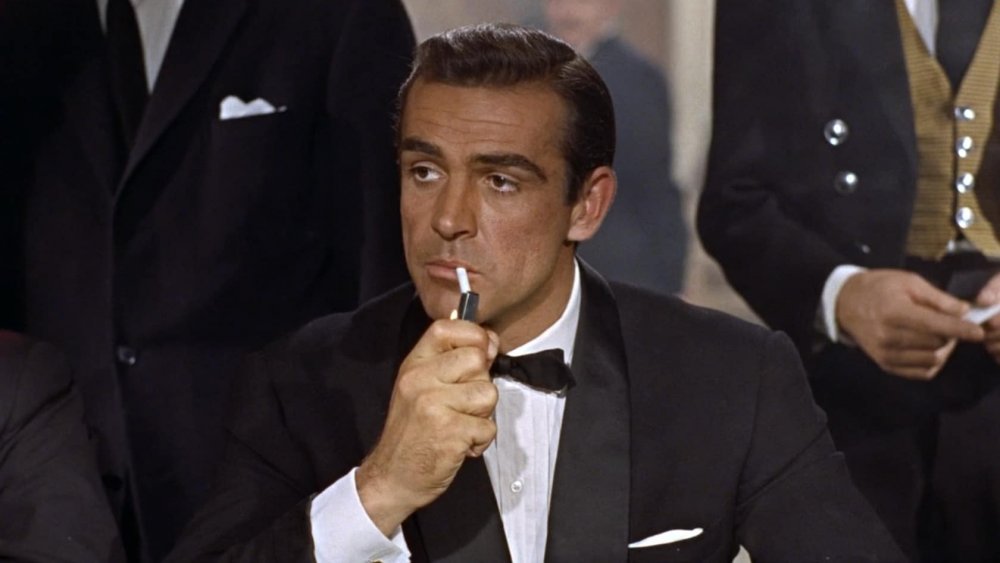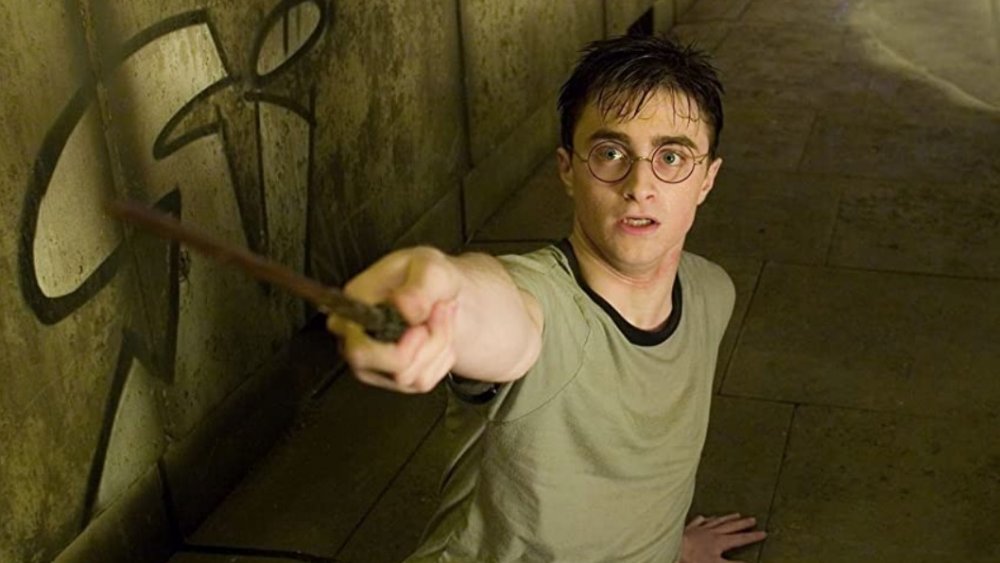The Highest-Grossing Book Adaptations At The Box Office
Comic book movies are all the rage these days and for good reason. The combined box office gross for every movie based on a comic book or graphic novel is ... well, it's a lot. You're more than welcome to add up those numbers, but we're guessing the total is north of the European Union's gross domestic product. Three of the highest-grossing movies worldwide are comic book films (all Avengers), with Avengers: Endgame being the biggest earner ever. But with all of the attention that's being paid to pulp-based IP, less love is given to comics' printed forebearers — books.
That's a mistake because movies based on books make a lot of money, too. In fact, many of the biggest ticket-sellers ever were based on books, with Gone With the Wind (based on Margaret Mitchell's best-selling novel) being the highest-grossing movie ever when adjusted for ticket price inflation. Books are big business at the box office, which makes sense. Reading a book is a significant time and emotional investment, so some of the most loyal, die-hard fans in all of pop culture are book lovers. But which ones made the most money?
Well, you may be surprised by the entries on this list or that some of these films were based on books in the first place. Maybe it'll even inspire you to read the source material yourself. But it won't surprise you that these all made truckloads of cash. From spy thrillers to whimsical fantasies, check out the highest-grossing book adaptations at the box office!
The How to Train Your Dragon adaptations taught us how to make cash
British author Cressida Cowell published her 12-book How to Train Your Dragon series starting in 2003 (though lead character Hiccup debuted in 2001's Hiccup: The Viking Who Was Seasick) and concluded it in 2015 with How to Fight A Dragon's Fury, which is probably a good thing to know, just in case. Cowell's books sold more than 7 million copies worldwide, and more importantly, they quickly caught the attention of Hollywood animation powerhouse DreamWorks. Though the series was never an animation box office powerhouse like Shrek, Toy Story, Finding Nemo, or Frozen, the How to Train Your Dragon franchise quietly became a reliable money-making series for a movie studio that needed one.
How to Train Your Dragon opened to $43 million in 2010 and went on to earn $217 million domestically and $494 million worldwide. While its domestic and international earnings have fluctuated some, the three-film series overall has always been stable, earning a combined $555 million domestically and $1.6 billion worldwide, delivering an average box office take of $185 million domestically and $543 million worldwide. Despite "concluding" the series (is any franchise ever concluded?), How to Train Your Dragon: The Hidden World wasn't only a hit, it was one of the few non-Disney sequels to succeed in the otherwise lukewarm 2019, so we wouldn't be surprised to see more ways to train dragons in the future.
The Bourne Bankability is real
Jason Bourne was born from the brain of novelist Robert Ludlum and first appeared in 1980's spy thriller The Bourne Identity. Ludlum followed it up with The Bourne Supremacy in 1986 and The Bourne Ultimatum in 1990. Sadly, Ludlum died in 2001, one year before The Bourne Identity made it to the big screen, so he never got to see his most famous literary creation become an international cinematic sensation. Thanks to The Bourne Identity's $121 million domestic and $214 million worldwide box office take, star Matt Damon successfully transformed from Oscar-winning wunderkind to bankable box office action star.
The Bourne film series continued to soar by bringing the rest of Ludlum's novels to the big screen. Meanwhile, after Ludlum's death and thanks to the film series' success, Eric Van Lustbader began writing new Bourne books, and he's currently penned 12, four times as many as series creator Ludlum. But despite filmmakers trying to relaunch the Bourne film series without its titular character in 2012's The Bourne Legacy, Matt Damon returned to his most famous role in 2016's Jason Bourne. The Jason Bourne series' combined $800 million domestic and $1.6 billion worldwide gross proves The Bourne Bankability is real.
Jumanji is a book adaptation ... sort of
When it comes to Jumanji, we're using the term "book adaptation" very loosely. American children's book author and illustrator Chris Van Allsburg published the fantasy children's book Jumanji in 1981. The original story is a playful yarn about a brother and sister named Peter and Judy Shepherd who play a mysterious, magical board game that summons exotic wild animals and tropical weather while they play. The 1995 film took major liberties with the story, focusing mostly on the adult Alan Parrish, who had his childhood and early adulthood stolen from him as he spent his formative years struggling to survive inside the game.
It was kinda depressing when you think about it, but audiences didn't care, as Jumanji earned $100 million domestically and $262 million worldwide. If the first film took liberties with the source material, the subsequent franchise relaunch said "to heck with it." Jumanji: Welcome to the Jungle trades a board game for a video game and Robin Williams for Dwayne "The Rock" Johnson. Audiences were even more into it than before. The Jumanji relaunch's success has been almost unprecedented, quietly becoming one of Sony's most bankable franchises. Welcome even outgrossed Spider-Man: Homecoming, and it's currently Sony's third-highest grossing film, only behind Skyfall and Spider-Man: Far From Home. Sure, the series has nothing in common with the book besides the name, but with a combined $849 million domestic and $2 billion worldwide, we doubt anybody's complaining.
This simian sci-fi novel launched a nine-film franchise
French author Pierre Boulle published La Planète des singes (roughly The Planet of Monkeys) in 1963. It was released as Monkey Planet in the United Kingdom and, more importantly, Planet of the Apes in the United States. Based on Boulle's original sci-fi novel, Hollywood spawned a nine-film cinematic saga that has lasted for more than 50 years. Planet of the Apes was released in 1968 and earned $33 million worldwide (about $245 million today) on a $5.8 million budget, a profitable sum that made it one of the top ten biggest earners of 1968. And thus, the Planet of the Apes franchise was born.
Though really, it's three different franchises. The first five-film series concluded in 1973 with Battle for the Planet of the Apes, which at just $8.8 million was not a chimp, er chip, off the old block. The series was relaunched in 2001 with Tim Burton's Planet of the Apes. Despite earning a tidy profit of $180 million domestically and $362 million worldwide on a $100 million budget, the movie's strange ending left a poor taste in moviegoer's mouths, and with surprising restraint, 20th Century Fox opted not to follow it up with sequels. Instead, the prequel Planet of the Apes trilogy arrived ten years later, and it was critically and commercially well-received. In total, the Planet of the Apes franchise has earned $793 million domestically and $2.1 billion worldwide.
Frozen brought this Hans Christian Andersen story out of the ice
Wait, Frozen was based on a book? Yep, in fact, Frozen is based on the oldest book on this list. If you're surprised by that, well, let it go (sorry, not sorry). Danish author Hans Christian Andersen's "The Snow Queen" was first published in 1845 in his book of fairy tales, and it's much different than the animated film that it would inspire more than a century and a half later. Unlike most of the Mouse House's animated blockbusters, Disney decided on a limited release for Frozen in 2013, and it opened to $243,390, which is basically what some parents have personally spent on Frozen-inspired merchandise for their kids.
The icy film caught fire, eventually earning an astonishing $400 million domestically and $1.2 billion worldwide (including more than $250 million in Japan), making it it the biggest hit of 2013 and one of the highest-grossing films of the decade, though The Hunger Games: Catching Fire won the year domestically. Frozen II was even more successful in 2019, raising the series' combined totals to $878 million domestically and $2.7 billion worldwide in just two films, a phenomenal average of $439 million domestically and $1.37 billion worldwide. Not bad for a 175-year old story. If only Andersen knew his fairy tale would be driving parents crazy long after he was gone.
There's nothing dystopian about The Hunger Games' success
We don't know what exactly it says about the prevailing mood among the world's teenagers, but one of the most popular young adult book series of the 21st century is a dystopian nightmare in which teenagers hunt each other in a broadcasted bloodsport. Okay then. Suzanne Collins' The Hunger Games trilogy has sold more than 50 million copies, outselling even the Harry Potter series on Amazon.com, thought to be fair, the last Harry Potter book, Harry Potter and the the Deathly Hallows, came out in 2007, back when people still bought books at bookstores. Still, in the world of publishing, beating Harry Potter in anything is a remarkable achievement.
The film's box office has been remarkable, too. The four films in The Hunger Games franchise (Lionsgate shrewdly turned the last book into two movies because money) have earned a combined total of $1.45 billion domestically and $2.9 billion worldwide. That's a per-film average of $362 million domestically and $739 million worldwide, a higher average than Twilight, with an average budget of $123 million. While the series did show signs of slowing down near the end with Mockingjay – Part 2, each of The Hunger Games movies opened to more than $100 million, bragging rights that no other book-based franchise on this list (and pretty much only The Avengers) can make.
Vampires, werewolves, and romance = $$$$
Except for die-hard fans and people under the age of 18, nobody would accuse Stephenie Meyer's Twilight Saga of being great literature. Not surprisingly, the film series it spawned isn't critically acclaimed, either, as the highest Tomatometer ranking is a tie between Twilight and The Twilight Saga: Breaking Dawn – Part 2, though each of these managed only a measly 49% score. But hey, even if your vampire series sucks, it doesn't matter when it makes so much money. The novels have been translated in 37 different languages and have sold more than 250 million copies.
The films have been equally impressive (money-wise that is), earning a combined $1.36 billion domestically and $3.3 billion worldwide, an average of $227 million domestically and $552 million worldwide, all with modest average budgets of $83 million. If you're feeling really generous, you could also note that E.L. James' best-selling Fifty Shades book series started as erotic Twilight fan fiction, and that film series earned a combined $381 million domestically and $1.3 billion worldwide (and even greater critical derision). So whether you're Team Jacob or Team Edward, Team Twilight (and the rip-offs it inspired) is a winner at the box office.
Shrek's success is not a fantasy
Children's book author and artist William Steig published Shrek in 1990. Shrek was well-received, winning "Best Children's Book of the Year" by Publishers Weekly and "Best Books of the Year" from School Library Journal in 1991, the same year Steven Spielberg acquired the rights. Ten years later, Shrek finally made it to the big screen, earning $267 million domestically and $491 million worldwide. Except for the basic plot, the cinematic Shrek bares little resemblance to the film, as DreamWorks turned Steig's charming children's book into a fractured fairy tale on speed.
Steig passed away in 2003, so he didn't get to witness his character's greatest success, Shrek 2, a film that was also the biggest departure from his original vision. The screenwriters must've been high on fairy dust when they conceived of such "comedic" bits as Pinocchio wearing a thong (in hindsight, the early aughts were a strange time). But moviegoers loved it, as Shrek 2 attracted both families and comedy-seeking adults, earning $441 million domestically and $935 million worldwide, outgrossing even Spider-Man 2 and Harry Potter and the Prisoner of Azkaban to become the biggest hit of 2004 by $130 million. The series saw diminishing returns with subsequent films, but all told, the Shrek franchise has earned a fantastic $1.4 billion domestically and $3.5 billion worldwide.
Best-selling book becomes highest-grossing blockbuster
The Jurassic Park movie series is one of the most successful ever, with $1.8 billion in domestic sales and $5 billion worldwide. Those numbers are even more impressive considering there are only five Jurassic Park movies (compared to 23 for the MCU and 11 live-action films for Star Wars), delivering average grosses of $376 million domestically and $1 billion worldwide, making it Hollywood's most profitable franchise based on budget. The franchise is also tied for second with The Avengers for breaking the opening weekend record three times (only Batman has done it more). But hey, what would you expect from a movie about dinosaurs based on the runaway bestseller from blockbuster novelist Michael Crichton, who reigned over popular culture for decades?
The Jurassic Park paperback novel sold 5.7 million copies before the film was even released, and the film became the highest-grossing movie ever worldwide (until Titanic). The series mostly continued that momentum. There's a caveat, though — only the first two films were based on Crichton's books. If you've ever read them, you also know the movies are very loose adaptations. Crichton's books reflect his "technology-run-amok," cerebral sci-fi worldview, while the films are wide-eyed adventures reflecting Spielberg's cinematic sense of wonder. Still, even if you just include Jurassic Park and The Lost World, that's still $631 million domestically and $1.7 billion worldwide, enough to make this list. Personally we'd love to see a more faithful adaptation of the books, sorta like HBO's Westworld (also a Michael Crichton adaptation) but better.
Tolkien's gold ring is worth a lot of green
J.R.R. Tolkien first welcomed readers to Middle-earth in 1937 for The Hobbit, or There and Back Again. His epic masterpiece The Lord of the Rings arrived nearly 20 years later, with The Fellowship of the Ring and The Two Towers both being published in 1954, followed by The Return of the King in 1955. The Lord of the Rings was a modest hit in the United Kingdom, but it found its greatest success ten years later on paperback, reaching the top of The New York Times paperback best-sellers list and effectively creating the mass-market science fiction and fantasy genre.
All told The Lord of the Rings has been translated into more than 50 languages and has sold more than 150 million copies. Despite being a publishing phenomenon in the 1960s, the epic stories filled with all sorts of fantastic creatures were often deemed unfilmable (studio speak for "really, really expensive"). Except for underwhelming animated adaptations in the 1970s, Tolkien fans satisfied their appetites with the books for decades. Then, 50 years after LOTR was published, New Line Cinema took a chance on a Kiwi filmmaker's vision of a big-screen version. The gamble paid off. Peter Jackson's The Lord of the Rings franchise (including the three The Hobbit prequel films) have earned $1.8 billion domestically and $5.8 billion worldwide, an average of $308 million domestic and $836 million worldwide. And that's no fantasy.
James Bond has a gold finger at the box office
Ian Fleming's suave British secret agent James Bond first fought for queen and country on the printed page in 1953's Casino Royale. Fleming published nine more Bond novels before the super spy made his way from pulpy paperbacks to the silver screen in 1963's Dr. No, which earned $16 million domestically and $59 million worldwide (nearly $500 million today) on a $1 million budget. Since then, 007 has delivered serious zeros at the box office for nearly 60 years, earning $2.1 billion domestically and $7.1 billion worldwide, the sixth biggest total for any franchise, with an average gross of $82 million domestically and $273 million worldwide.
While there have been several James Bond films, the majority of them were released when ticket prices were much lower, making Bond's box office bankability all the more impressive. Ian Fleming wrote his last James Bond book as two short stories, Octopussy and The Living Daylights, in 1966, which were adapted into films in 1983 and 1987, respectively. Fleming wrote 15 James Bond stories total (in 14 books), which were all adapted into films. However, these comprise only about half of the film franchise's total, proving that pop culture's most famous spy remains Bond ... James Bond.
The Harry Potter adaptations are simply magic
No surprise here. J.K. Rowling's Harry Potter novel series was a genuine publishing phenomenon, selling more than 500 million copies in 80 languages worldwide. At a time when parents, educators, and other talking heads were clutching their pearls over the decline of reading, kids of all ages (and adults, too) would line up for blocks to pick up the latest Harry Potter book, frequently reading the 500-plus page tomes in one sitting. Harry Potter also made J.K. Rowling the first person to become a billionaire from writing books. Naturally, a film series was a sure thing.
The Harry Potter franchise is the third-most successful ever, earning $2.78 billion domestically and $9.2 billion worldwide across 12 films, for an average of $317 million domestically and $814 million worldwide. The franchise has also broken the opening weekend-record twice, with the inaugural Harry Potter and the Sorcerer's Stone in 2001 and the climatic Harry Potter and the Deathly Hallows – Part 2 in 2011 (yes, Warner Brothers released eight Harry Potter movies in only ten years). These numbers also include the spin-off prequel series Fantastic Beasts and Where To Find Them, but let's be real — it's Harry, Ron, and Hermione that people pay to see (and who we'd like to see again). Until the spell is broken, Harry Potter remains the highest-grossing book adaptation at the box office.
